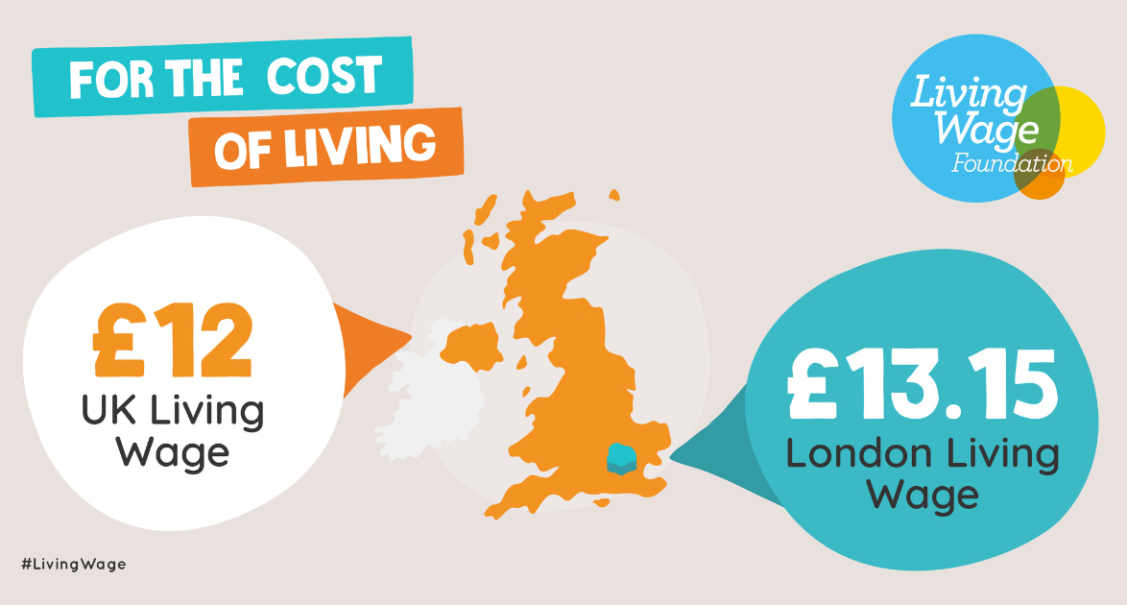November 6th through 12th is Living Wage Week!
Living Wage Week is put on by the Real Living Wage Foundation to celebrate and bring awareness to the importance of a fair and liveable wage for all.
What is the Real Living Wage?
Each year, the Real Living Wage is independently calculated based on the cost of a basket of household goods and services, linking it much closer to the cost of living (click here to watch more about how the Real Living Wage is calculated). Accredited Living Wage Employers like Red Balloon Educational Trust voluntarily pay this wage (or above) to all our employees. Currently, it’s £13.15 in London and £12 in the rest of the UK.
On the other hand, the ‘National Living Wage’, currently £10.42, is a statutory minimum wage set by the government. It’s based on ‘medium earnings’ and ‘aims to reach ‘66% of median earnings by 2024’ (Living Wage Foundation). The National Living Wage is linked to others’ earnings rather than the actual cost of living and only applies to those aged 23 and above, excluding a whole host of people like university students and young carers.
Those aged 21-23 are paid the minimum wage, currently £10.18 per hour, and those under 21 even less (£7.49 per hour for those aged 18-20 and just £5.28 per hour for those under 18).
Why It’s Important
While the current cost-of-living crisis has reignited the fight against low pay, a living wage has always been important to ensure that those on the lowest wages are protected and can still afford to meet their basic needs. If they can’t, they risk falling into poverty which the Joseph Rowntree Foundation defines as ‘when your resources are well below your minimum needs’.
Poverty can have a number of insidious consequences like health and mental health problems, substance abuse, family problems, homelessness and domestic abuse (Joseph Rowntree Foundation). Poverty also has a detrimental effect on children’s development and ability to learn. When parents or carers have to work multiple low-paid jobs to keep the lights on, there is no time to read bedtime stories, help with homework or cheer on the sidelines of a football match. It can mean housing instability, forcing young people to switch schools (or miss school altogether), miss out on learning and making it difficult to form strong friendships. It can mean food insecurity or lack of access to quality food which has a direct impact on children’s physical health and ability to learn.
Unfortunately, this is far from uncommon. In the UK in 2020-21, 13.4 million people, or around 20% of the population, was living in poverty. Of those 13.4 million people, 3.9 million were children (UK Poverty 2023 report). A living wage helps to protect people from poverty. It helps to provide stability, options and dignity for workers and their families.
Charity and a Living Wage
Like many charity workers, much of Red Balloon’s staff does not do this work just for the paycheck. We have a deep desire to help young people disenfranchised by the mainstream education system. Talking to staff, many will tell you how much they love their jobs! However, the rewarding nature of this work does not replace the need for a wage that enables a dignified standard of living.
Beyond this we want our staff to feel valued, supported and able to enjoy their time away from Red Balloon! We champion wellbeing across the entire organization, and a living wage is part of this. When staff’s needs are met, they’re able to rest and relax away from work, and when they return, they’re refreshed and better equipped to support our students to get back on their feet and thrive.
We’re proud to be a Real Living Wage employer certified by the Living Wage Foundation and to spread the word about this important initiative.


